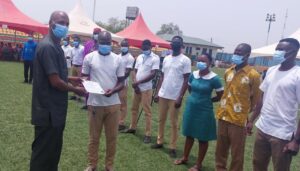Catholic Relief Services to invest $5.3m in water, sanitation and hygiene programmes
 Mr Daniel Mumuni, the Country Representative of Catholic Relief Services (CRS), says the service will support Water, Sanitation and Hygiene (WASH) programmes with $5.3 million in the next 18 months to improve access and behaviour change for beneficiary communities.
Mr Daniel Mumuni, the Country Representative of Catholic Relief Services (CRS), says the service will support Water, Sanitation and Hygiene (WASH) programmes with $5.3 million in the next 18 months to improve access and behaviour change for beneficiary communities.
He said, “As I am speaking, 45 boreholes, two limited mechanised water systems and 38 institutional latrines are still under construction, majority of which are in the Mamprugu-Moaduri District. Completion and operationalisation of these facilities will have far-reaching implications on safe water access in the beneficiary communities.”
He announced this at a ceremony to commemorate this year’s World Water Day at Walewale in the West Mamprusi Municipality of the North East Region.
It was organised by CRS and partners on the theme: “Groundwater – Making the Invisible Visible.”
World Water Day is celebrated in March, every year, and has been instituted by the United Nations to create awareness and garner broad support for improving access to safe drinking water, especially among vulnerable populations.
Mr Mumuni said the CRS was collaborating with selected Municipal and District Assemblies, Ghana Education Service and Ghana Health Service (GHS) to provide WASH services to deprived communities and needy institutions through the implementation of various projects from 2012 to 2022, which impacted the lives of more than one million people.
He said the implementation of the various WASH projects resulted in the construction of 286 boreholes fitted with hand pumps, 13 limited mechanised water systems, 385 institutional latrines for schools and health facilities, certification of 144 communities as open defecation free communities, certification of 106 schools and 36 health facilities as WASH friendly institutions.
Safe water access in West Mamprusi and Talensi Districts improved from 68 per cent to 81.7 per cent, and safe sanitation access in West Mamprusi and Talensi Districts improved from 27 per cent to 70 per cent.”
On the water crisis facing communities and cities, he called on stakeholders to advocate, develop and implement policies and regulations that ensured responsible abstraction of groundwater to enable natural recharging of aquifers.
Mr Gustav Osiakwan, the North East Regional Director of Community Water and Sanitation Agency, said groundwater, like other natural resources, was finite and vulnerable, hence must be carefully abstracted, protected and properly managed to ensure its availability and sustainability.
He encouraged individuals and institutions to seek professional advice before drilling boreholes to enable beneficiaries’ access to safe water, which he described as paramount in the water supply chain.
Dr Mrs Mary Eyram Ashinyo, a representative from the GHS, said the theme for the event should draw the attention of all stakeholders to the importance of hidden water resources not fully recognised in the sustainable development policy-making.
She called on stakeholders to focus on explaining groundwater vitality in water and sanitation systems, health, agriculture, industry, ecosystems and climate change adaptation.
Mr Yidana Zakaria, the North East Regional Minister, in a speech read on his behalf, expressed gratitude to CRS for its continuous humanitarian and life-changing interventions in the region.
Source: GNA
